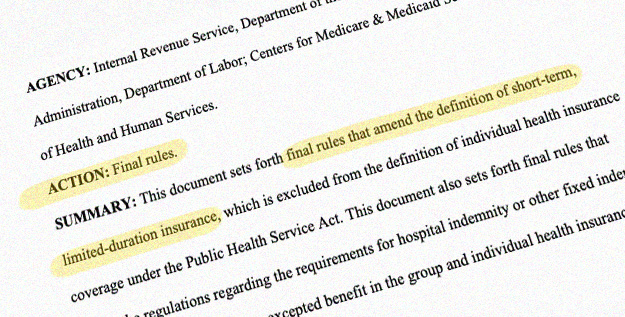In this article
What is the ACA's preventive health services coverage mandate?
The ACA requires nearly all health plans to cover a wide range of free preventive care benefits without any patient cost-sharing.
What preventive health services are free under the mandate?
Services have to fall into one of three categories in order to be under the umbrella of preventive care that non-grandfathered health insurance plans must provide at no cost to the consumer at the time of service. (It’s understood that the cost of preventive care is wrapped into the premiums that we all pay each month.)
- Wide-ranging preventive care for everyone – rated “A” or “B” in the current United States Preventive Services Task Force (USPSTF) recommendations. (As detailed below, a federal judge ruled in 2023 that preventive care recommended by the USPSTF should no longer be included in the preventive care that health plans have to cover without patient cost-sharing, but a temporary stay was issued and the ruling has since been put on hold while the case is appealed.)
- Preventive care for women and children – recommended in the guidelines from the Health Resources and Services Administration (HRSA), including the Bright Futures recommendations for children (infancy through age 21) and the Women’s Preventive Services Guidelines. (This care includes no-cost female contraception coverage, which has been challenged in court and subject to evolving rules under different presidential administrations. In an effort to ensure improved access to zero-cost female contraception, the Biden-Harris administration proposed new rules in 2023 that would walk back some changes made under the Trump administration. CMS also published FAQs in 2022 and 2024, addressing a variety of specific details in terms of what health plans are required to provide in terms of contraceptive coverage.)
- Vaccines for children and adults – recommended by the Centers for Disease Control & Prevention’s Advisory Committee on Immunization Practices (ACIP). Numerous immunizations are recommended, including those for influenza, meningitis, tetanus, pertussis, mumps, measles, rubella, varicella, HPV, hepatitis A and B, and COVID-19. Some vaccine recommendations are age-specific, such as the recommendation that people get vaccinated against shingles once they’re at least 50 years old.
KFF’s preventive services tracker includes a note for each service, clarifying which body recommends it. That’s important in terms of the lawsuit over covered preventive care, which we’ll discuss in a moment.
Has the ACA's preventive health services provision been struck down?
On March 30, a federal judge overturned some aspects of ACA’s preventive services coverage requirement. However, the Department of Justice appealed the ruling to the 5th Circuit Court of Appeals in New Orleans, and asked the court for a temporary stay. That was granted in May 2023, in a move that was applauded by numerous patient advocacy groups.
And the following month, an agreement was reached that put the judge’s ruling on hold throughout the appeals process, meaning that preventive services will continue to be covered while the case is appealed (the agreement does allow plaintiffs in the case to potentially stop covering certain preventive services, but not any other entities). The appeal could eventually make its way to the Supreme Court.
Will preventive care coverage change immediately due to the court ruling?
No, because an agreement has been reached that prevents the ruling from being implemented while the case is being appealed. Even if the 5th Circuit Court of Appeals upholds the lower court’s ruling, the ruling would continue to not be implemented unless it’s upheld by the Supreme Court.
Even before the stay was issued and the subsequent agreement reached, it was expected that there would not be immediate widespread coverage losses for preventive care. As soon as the ruling was handed down, AHIP – which represents health plans – issued a statement noting that “Americans should have peace of mind there will be no immediate disruption in care or coverage.”
Calendar-year plans issued by health insurers generally couldn’t have made changes until the start of 2024 at the earliest. But if the ruling had not been paused, people with self-insured group health coverage could have started to see reductions in their preventive care coverage as early as the summer of 2023. The pause on implementation prevents that outcome and preserves preventive care benefits for the time being.
What preventive care coverage could be lost due to the court ruling?
The final judgment in Braidwood v. Becerra overturns some aspects of the ACA’s preventive care coverage rules, but leaves others intact. If the ruling is eventually upheld, the impact depends in large part on which agency recommends the preventive care in question:
- The ruling does not affect HRSA (Health Resources and Services Administration) recommendations regarding preventive care for children and women, including contraception, nor ACIP (Advisory Committee on Immunization Practices) recommendations regarding vaccines for children and adults.
- But the ruling says that health plans no longer have to cover USPSTF (U.S. Preventive Services Task Force) recommendations made since March 23, 2010, when the ACA was enacted. The ruling does not allow health plans to stop covering preventive services that were already recommended by USPSTF prior to March 23, 2010. But most USPSTF recommendations have been updated since 2010. So if the ruling is upheld, health plans could revert to the recommendations that existed in 2010.
- The ruling specifically overturned the requirement that PrEP HIV prevention drugs be covered by the plaintiffs’ health plans. But PrEP is currently covered by health plans because it has an “A” rating from USPSTF, issued in 2019. So that coverage requirement would end for all health plans if the ruling is upheld.
Why did a judge overturn some ACA preventive care coverage requirements?
A judge for the U.S. District Court in the Northern District of Texas ruled that requiring health plans to cover services recommended by the USPSTF violates the Appointments Clause of the U.S. Constitution, because members of the USPSTF have not been nominated by the president or confirmed by the Senate. (This is by design. Congress intended this body to be comprised of experts who are free from political interference.)
The judge also ruled that requiring health plans to cover PrEP (for prevention of HIV transmission) is a violation of the plaintiffs’ religious freedom under the Religious Freedom Restoration Act. (As noted above, PrEP has an “A” rating from the USPSTF that was issued in 2019, so if recent USPSTF recommendations are eliminated from health plan coverage requirements, that would effectively remove the requirement to cover PrEP.)
The judge did not rule against ACIP and HRSA having the authority to recommend preventive care requirements for health plans. So if his ruling were to eventually be upheld by a higher court, it would potentially mean that some currently-covered preventive services would become optional for health plans to cover with zero cost-sharing, while others would not.
Does the ruling affect no-cost coverage of cancer screenings?
Even if the court ruling is upheld, health plans would continue to have to cover some cancer screenings at no cost to their enrollees:
- Screening mammograms for breast cancer are recommended by HRSA, so that coverage would continue to be required.
- HRSA also recommends pap smears with HPV tests for women age 30 and older, so that coverage wouldn’t change. But USPTST has issued updated pap smear guidelines for younger women, which could be affected by the court ruling.
- Colonoscopy screening was already recommended by USPSTF prior to March 2010, so it would still have to be covered. But the guidelines were updated in 2021 to include people as young as age 45. Screening recommendations previously started at age 50, and could revert to that guideline if the court ruling is upheld.
- Lung cancer screening for current and former smokers was added to the USPSTF list of recommendations in 2013, so it’s an example of a screening test that health plans would no longer have to cover if the ruling is upheld, since it was added after the ACA was signed into law.
Did the court ruling affect no-cost coverage of contraception?
Contraceptive coverage is not affected by the 2023 court ruling. There have been other challenges to the contraceptive mandate over the years, and the Trump administration made it easier for health plan sponsors to get an exemption from the coverage requirement if they have religious or moral objections to contraception. But the Biden-Harris administration proposed new rules in 2023 that would roll back some of those changes and ensure that women could still have access to zero-cost contraception even if their employer or school has a religious exemption. Those rules had not yet been finalized as of early 2024.
One note about free contraception: Although non-grandfathered health plans are required to cover all types of FDA-approved female-specific contraception, they’re only required to offer one version of each type with no cost-sharing. They can impose cost-sharing for other versions. So it’s not true that all contraception is covered for free. Rather, at least one version of each type of contraception is covered for free.
CMS has clarified a variety of questions about contraceptive coverage, including the fact that anesthesia necessary for tubal ligation must be covered in full (along with the cost of the tubal ligation), health plans must cover the cost of instruction in fertility awareness contraception methods, and that emergency contraception must be covered just like other contraceptive methods.1
Do health plans still have to cover vaccines at no cost?
Yes. Vaccine coverage is not affected by the 2023 court ruling. Non-grandfathered health plans have to fully cover the cost of vaccines recommended by the Advisory Committee on Immunization Practices (ACIP). The court ruling does not affect ACIP recommendations, so health plans must continue to cover recommended vaccines even if the ruling is upheld.
Is weight loss treatment covered as a preventive care benefit?
The federally mandated preventive care rules require health plans to cover obesity screening and counseling and diet counseling for people at high risk of chronic disease. But federal rules do not require any coverage of other weight loss treatments.
For health plans offered in the individual/family and small group markets, states set their own benchmark plans to define what essential health benefits must be covered by plans issued in the state. Almost half of the states have bariatric surgery in their benchmark plans, but anti-obesity medications are very rarely included. In part, this is because most states’ current benchmark plans date back to 2013, before these medications became available.
Fully insured large group plans are not subject to essential health benefit rules, although states can impose coverage mandates for these plans. Self-insured plans, which cover the majority of people with employer-sponsored health plans, are not subject to state rules.
Does the ruling mean that health plans have to stop covering preventive care at no cost?
Definitely not. Even if the court ruling is upheld and health plans are no longer required to cover certain preventive services without cost-sharing, plans will still be able to choose to do so. The ACA’s preventive coverage mandate is among the law’s most popular features, and the benefits are used by about 100 million Americans each year. Employers use their benefits package as a tool to attract and retain employees, and free preventive care tends to be fairly inexpensive to provide.
The Association for Community Affiliate Plans, which represents 79 health plans covering 25 million people, criticized the ruling and urged the Justice Department to appeal it. And in a statement clarifying that benefits would not change immediately and that the case would be appealed, AHIP (America’s Health Insurance Plans) noted that “every American deserves access to high-quality affordable coverage and health care, including affordable access to preventive care and services that help avoid illnesses and other health problems.”
Can states require health plans to continue to cover preventive care at no cost?
For health plans that are regulated at the state level (ie, plans that aren’t self-insured), states could require health plans to continue to cover USPSTF-recommended care with no cost-sharing, even if that requirement is eliminated at the federal level. States could ensure this is part of their benchmark plan, which would apply to individual and small group plans, or could impose legislation that applies to all state-regulated plans, including large group plans.
Several states have already taken action on this, and others could follow suit. But states do not regulate self-insured health plans, which cover the majority of people who have employer-sponsored health coverage in the U.S.
Why do some mammograms and colonoscopies have out-of-pocket costs?
Mammograms and colonoscopies are examples of procedures that can be classified as “screening” or “diagnostic” procedures, depending on the circumstances. This matters a lot in terms of health coverage, because health plans are only required to cover the full cost if it’s a screening procedure. If it’s diagnostic, your plan’s regular cost-sharing can apply (deductible, copay, and/or coinsurance).
For a mammogram or colonoscopy to be considered a screening procedure, it has to be done on the timelines recommended by USPSTF or HRSA, and in the absence of any symptoms.
- Timing: For mammograms, that means no more than once per year starting at age 40. For colonoscopies, it means no more than once every ten years, starting at age 45. So if you have a screening colonoscopy and a polyp is found and your doctor tells you to come back in three or five years, that second colonoscopy is going to be considered diagnostic (which means there will be out-of-pocket costs), since it will have been less than ten years since your last one.
- Absence of symptoms: The procedure has to be performed simply because it’s time to do so, and not due to anything you or your doctor have noticed. So if you’ve had blood in your stool or have found a lump in your breast, a colonoscopy or mammogram to check things out will be considered diagnostic and there will be out-of-pocket costs. This is true even if you would otherwise qualify for a screening test due to your age. For example, if you’re due for your annual mammogram and your doctor finds a lump during your annual exam and then sends you to get your mammogram, it will be considered diagnostic due to the presence of the lump.
One note about colonoscopies: CMS has confirmed that health plans are not allowed to impose out-of-pocket costs for polyp removal performed during a regular screening colonoscopy (see Q5 in these FAQs), and the plan must also pay for pathology testing for the polyps. So if you go in for a screening colonoscopy and polyps are found, removed, and tested, the health plan still has to cover the procedure with no out-of-pocket costs. But your doctor will likely then have you return for another colonoscopy in three or five years, and you should expect to have out-of-pocket costs for that follow-up procedure.
Does health insurance cover preventive care as soon as experts recommend it?
In normal circumstances, there’s a delay that can last nearly two years before recommendations from USPSTF, HRSA, or ACIP are built into health insurance plans. But for COVID-19 vaccines, that was shortened to just 15 business days. ACIP finalized their recommendation for the COVID-19 vaccine in mid-December 2020, so all non-grandfathered health plans had to cover COVID-19 vaccines with zero-cost sharing as of early January 2021 (which was well before the vaccines were actually avalable for most people).
Preventive care recommendations have evolved considerably over time, and the recommendations have been gradually incorporated into health coverage as they were updated. For example, in 2021, USPSTF lowered the recommended age to begin screening colonoscopies from 50 to 45, and health plans had until 2023 to implement that change (many of them did so well before that). As described above, a federal judge has ruled that health plans do not have to cover USPSTF recommendations made since March 23, 2010. If that ruling is upheld and implemented, health plans could revert to the coverage recommendations that were in place in 2010, although it’s unclear how many of them would opt to do so.
Louise Norris is an individual health insurance broker who has been writing about health insurance and health reform since 2006. She has written dozens of opinions and educational pieces about the Affordable Care Act for healthinsurance.org.
Footnotes
- FAQs About Affordable Care Act Implementation, Part 54. Centers for Medicare and Medicaid Services. July 2022. ⤶











